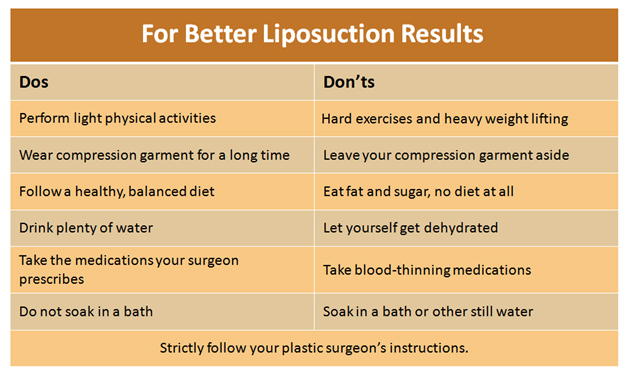Fruitful results from any plastic surgery can be achieved only with proper post-operative care. Liposuction is not an exception. New York City liposuction procedure is ideal to remove fat from various parts of the body that haven’t responded to even strict diet and exercise programs. But better care is crucial during the post-surgery stage for long-term results.
Minimally invasive and non-invasive liposuction technologies are available now, for which the recovery period will be much shorter. The larger the treated area, the longer your recovery is likely to last. According to the American Society of Plastic Surgeons, other factors that can affect your speedy recovery are medical history, overall health, and age.
Post-liposuction Care
For long-term liposuction results, understand what not to do and what to do after your surgery.
1. Performing Strenuous Exercises
Though liposuction is a great option for patients to burn excess body fat, they cannot assume that the procedure will forever remedy their aesthetic concern if they don’t eat healthy and exercise regularly after the procedure. Exercise is critical to maintain the surgery results and keep the fat from returning after the procedure. However, hard exercises and heavy weight lifting too soon after the procedure can impact the healing. It can also increase the amount of post-operative swelling a patient can expect to have.
Instead of staying stationary, it is important to leisurely walk around after the surgery to promote good circulation. Based on the Realself answers from expert surgeons, it is crucial to avoid any strenuous activities four to six weeks following liposuction. It has been recommended to first consider gentle walks without sweating, and after four months you can consider machine exercise and light weights, and free weights after six months. As the procedure recovery varies from patient to patient, it’s important to discuss the situation with your plastic surgeon, as the surgeon would be able to make an appropriate recommendation based on post-operative progress.
- What to do
Perform light physical activities without pushing yourself too much.
2. Not Wearing A Compression Garment
After liposuction, plastic surgeons may recommend wearing a compression garment for a few weeks. Some patients may not follow this instruction, which can result in negative consequences. It is important to wear a compression garment for several reasons such as the following to
- Ensure a comfortable recovery
- Get optimal results
- Reduce pain and swelling
- Decrease bruising
- Improve scarring
- Keep stitches and dressings in place
- Increase circulation
- Help the body adapt to its new streamlined shape
- Lessen post-procedural risks associated with liposuction
A Realself article explains that as liposuction removes subcutaneous fat between the skin and muscle, the layer of skin does not immediately adhere to the muscle underneath. Also, there is a tendency for fluid to accumulate in the space previously filled with fat. By wearing a compression garment, pressure will be applied to these areas so the fluid disperses rather than build up. It has also been proven that most of the patients who comply with the recommendation to wear a compression garment after surgery have achieved better results.
- What to do
Wear a compression garment based on your surgeon’s instructions.
3. Not Maintaining A Good Diet
Though body sculpting through liposuction helps in improving your physical appearance and contouring your body, there are possibilities for some fat cells to still remain and grow. To maintain the results in the months and years after liposuction, it is critical to balance your diet and stay active. A proper diet can prevent weight gain. According to the American Society of Plastic Surgeons, to maintain good results after liposuction, you can incorporate more fruits, vegetables, whole grains, and lean protein into your diet, while reducing the intake of sugars, simple carbohydrates, and saturated fats.
- What to do
Follow a healthy diet along with exercise
4. Not Drinking Plenty Of Water
Post surgery, focus on staying well hydrated. Drinking a lot of fluids will help to flush out from your body the medicines administered during surgery, including the anesthetic. It also helps to reduce the risk of excessive swelling after the operation. Restricting intake of fat and calories after surgery and drinking more water can significantly improve the long-term results of liposuction.
- What to do
Drink plenty of water
The surgeon may also advise not to take any blood-thinning medications, as it increases the risk of dangerous bleeding after liposuction. However, make sure to take the medications prescribed by your plastic surgeon. Plastic surgeons in NYC advise patients not to get soaked for a long time in any still water for at least four weeks after surgery. This recommendation depends on the dressing or bandage type used. While some surgeons use a waterproof dressing, others use traditional non-waterproof bandage.


